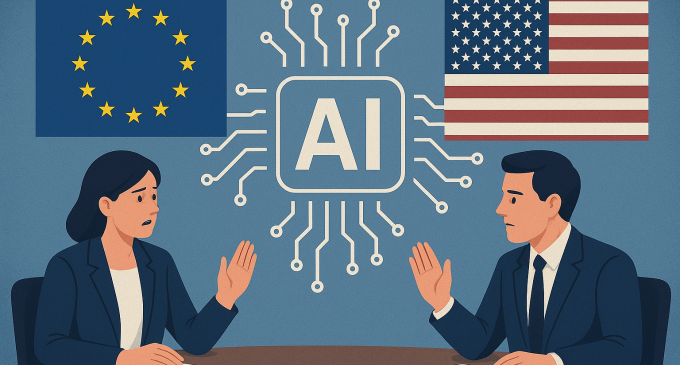
Introduction
The European Union is re-evaluating its timetable for implementing the world’s first comprehensive artificial intelligence law, the Artificial Intelligence Act. The European Commission has indicated that it may delay several of the Act’s key provisions, citing pressure from large technology companies and growing diplomatic tension with the United States. This development has sparked intense debate across Europe about the balance between innovation and regulation, and the question of whether Europe can maintain its leadership in setting global standards for artificial intelligence governance.
Background: The Origins And Objectives Of The AI Act
The Artificial Intelligence Act, adopted in 2024, marked a milestone in global technology regulation. It was designed to establish a legal framework that governs the use, development, and deployment of AI systems based on their potential risk to individuals and society. The law classifies AI into four categories: unacceptable risk, high risk, limited risk, and minimal risk. Systems falling under the high-risk category—such as AI used in healthcare, law enforcement, and critical infrastructure—are subject to the strictest requirements, including transparency, data quality, human oversight, and accountability.
The Act’s principal goal was to ensure that AI technologies align with European values of privacy, fairness, and human dignity while fostering innovation in a competitive global landscape. Its phased implementation plan aimed to give companies time to adapt, with the most significant obligations originally scheduled to take effect in August 2026. The European Union hoped the legislation would serve as a model for responsible AI worldwide, similar to how the General Data Protection Regulation set the standard for data privacy.
The Proposed Changes: Delays And Adjustments
In late 2025, reports emerged that the European Commission was preparing to introduce a one-year delay to some key enforcement dates of the AI Act. The potential changes include:
Extending the grace period for high-risk AI providers already operating in the market, allowing them additional time to align their systems with the new compliance requirements.
Postponing penalties for transparency violations, potentially pushing them into 2027 to give companies more time to establish the necessary internal compliance systems.
Reducing the rigidity of monitoring and reporting requirements by offering more flexible implementation guidance.
While these measures are still under discussion, they represent a significant shift from the EU’s earlier stance of strict and timely enforcement. The Commission has justified the potential delay as a pragmatic adjustment that ensures the Act is implemented smoothly, rather than rushed and fragmented. Critics, however, fear that any delay risks weakening the EU’s credibility as the global leader in AI regulation.
Why The Change: Pressure From The United States And Big Tech?
Political and Economic Tensions
The United States government, under the Trump administration, has made clear its opposition to what it views as excessive European regulation that disadvantages American technology firms. In recent months, Washington has hinted at possible retaliatory trade measures targeting countries that impose what it calls discriminatory tech rules. European policymakers insist that their laws are based on fundamental rights and public interest, not protectionism, but the geopolitical pressure is undeniable.
The timing of these discussions coincides with heightened transatlantic tensions over digital policy, data sovereignty, and the dominance of U.S. technology giants in global markets. The EU’s efforts to assert regulatory independence are now colliding with the strategic and economic influence of the United States, whose technology sector remains the most powerful in the world.
Lobbying by Big Tech
Major technology companies have also lobbied intensively against the AI Act’s strict obligations. They argue that the law’s broad definitions of high-risk systems, combined with complex documentation and auditing requirements, could hinder innovation and impose excessive costs. Some executives claim that the rules are too vague and could penalize developers even for minor technical errors or unintended biases.
Lobbyists have urged the European Commission to adopt a “light-touch” approach and delay full implementation to give industry time to adapt. Their campaign has been bolstered by European industrial groups that rely on AI technologies, such as automotive, manufacturing, and aerospace firms, who fear that stringent rules could slow down digital transformation and competitiveness.
Concerns from European Industry
While the AI Act was intended to strengthen Europe’s technological ecosystem, some European companies are now warning that it might have the opposite effect. Industry leaders from sectors like aviation, transportation, and manufacturing argue that overly rigid rules could deter investment and drive innovation outside Europe. They have called for a measured rollout of the Act and better alignment with international standards to avoid regulatory isolation.
The Stakes: Regulation, Innovation, And Global Competition
Legal Certainty and Business Confidence
The AI Act was designed to provide businesses with a clear regulatory roadmap. A delay in enforcement could undermine that certainty. Companies that have already invested heavily in compliance systems may now face uncertainty over shifting deadlines and evolving expectations. This uncertainty could discourage long-term planning and create uneven competition between those who comply early and those who wait.
Innovation and Economic Impact
Supporters of a delay argue that flexibility is necessary in an environment of rapid technological change. AI systems are advancing faster than anticipated, and premature regulation could stifle innovation. However, critics maintain that strong rules are necessary to ensure that innovation remains ethical and trustworthy. Europe’s decision will therefore shape not only its own AI landscape but also global standards of responsible AI development.
Strategic Sovereignty
At stake is Europe’s broader ambition to achieve “digital sovereignty” — the ability to set its own rules for technology without dependence on external powers. The European Commission has consistently argued that regulating AI is a matter of sovereignty and values. Yet the potential delay raises questions about whether external pressure from the United States and multinational corporations is influencing Europe’s legislative independence.
Human Rights and Social Protection
The AI Act was crafted with an emphasis on safeguarding fundamental rights, preventing algorithmic discrimination, and ensuring transparency in systems that affect people’s lives. Any delay in implementation means that citizens may have to wait longer for these protections to take effect. Civil society organizations and consumer rights advocates warn that postponing enforcement could leave individuals vulnerable to unchecked AI systems in critical areas like employment, healthcare, and law enforcement.
The Road Ahead: What Comes Next?
The European Commission is expected to publish its final decision on the implementation timeline before the end of November 2025. Once released, any proposed adjustments will need to be approved by EU member states and the European Parliament. The decision-making process will likely involve heated debate among policymakers, industry representatives, and advocacy groups.
Several possible outcomes are on the table:
A limited delay — A short postponement of certain deadlines without altering the law’s core structure.
A broader deferral — A comprehensive extension of key enforcement provisions by a year or more, allowing companies more flexibility.
Targeted reform — Focusing delays only on high-risk categories while keeping other elements on schedule.
No delay — Maintaining the original timeline to preserve the EU’s credibility as a regulatory leader.
Each outcome carries trade-offs between market competitiveness, legal predictability, and ethical oversight. The choice will reflect how the EU balances economic pragmatism against its commitment to public protection and technological accountability.
Global Implications
The European Union’s decisions on AI regulation reverberate far beyond its borders. The AI Act has already influenced similar initiatives in Canada, Brazil, and Australia, and discussions are underway at the United Nations about creating a framework for global AI governance. If the EU delays or weakens its law, other countries may follow suit, slowing the momentum for ethical AI regulation worldwide.
Conversely, if Europe stays firm, it could continue to shape global standards and encourage alignment across jurisdictions. The Act’s impact will depend not only on its content but also on how consistently and confidently it is applied.
Reactions Across Europe
Within the European Parliament, opinions are divided. Some lawmakers have condemned the idea of delaying enforcement, arguing that it would create legal uncertainty and undermine the EU’s moral authority. They believe that citizens deserve immediate protection against potentially harmful AI applications.
Others take a more cautious view, suggesting that the EU must balance its ethical ambitions with economic realities. They argue that a short delay is preferable to a rushed and flawed rollout that could burden regulators and companies alike. National governments within the EU also have differing perspectives, reflecting their varied levels of digital maturity and industrial dependence on AI.
Challenges In Implementation
Even without delays, the AI Act faces significant challenges in execution. Member states must establish enforcement agencies, auditing mechanisms, and certification systems capable of evaluating complex AI models. Small and medium-sized enterprises, in particular, will need guidance and resources to meet compliance standards.
There is also the question of enforcement capacity. Regulators must recruit technical experts, build AI testing infrastructure, and coordinate across borders to monitor multinational companies. The success of the Act depends not only on legal wording but also on operational readiness — something that may justify limited adjustments to the timeline if done transparently.
Conclusion
The European Union’s deliberation over delaying parts of the AI Act represents more than a scheduling question. It is a defining moment for Europe’s digital future. Will the EU uphold its reputation as the global leader in responsible technology governance, or will it yield to political and commercial pressure?
A delay might seem like a practical compromise, but it risks signaling hesitation at a time when AI’s societal impact is expanding rapidly. The Act’s original purpose — to balance innovation with ethical responsibility — remains essential. Whether implemented in 2026 or later, the measure of success will be how well Europe can maintain that balance while defending its sovereignty, values, and leadership in global AI governance.







There are no comments at the moment, do you want to add one?
Write a comment